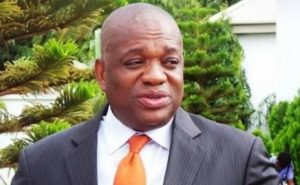
The trial and conviction of former governor of Abia State, Orji Kalu, and others for N7.1bn fraud has been nullified by Supreme Court on Friday.
Kalu and his co-accused were on December 5, 2019 convicted and sentenced to jail terms by Justice Mohammed Idris, who was already a Justice of the Court of Appeal, but returned to Federal High Court in Lagos, to conclude the case.
But in a unanimous judgment of a seven-man panel led by Justice Olabode Rhodes-Vivour, the apex court nullified the entire trial, including the conviction and sentencing, on the grounds that Justice Mohammed Idris’ return from the Court of Appeal bench to the Federal High Court to conclude trial was unconstitutional.
It also ordered a fresh trial for Kalu and his co-defendants.
The Friday’s judgment of the Supreme Court was on an appeal filed by one of Kalu’s co-defendants, Jones Udeogu, challenging the fiat given to Justice Idris by the then President of the Court of Appeal on the strength of Section 396(7) of ACJA, to return to the Federal High Court to conclude the trial.
Although, Kalu and Udeogu had, in 2018, applied to the then President of the Court of Appeal, Justice Zainab Bulkachuwa (retd), to issue a fiat to Justice Idris to enable him to conclude the trial, they turned around to challenge the constitutionality of the fiat after it was issued to Justice Idris and the trial had made further progress.
Justice Ejembi Eko, who delivered the Supreme Court’s lead judgment on Friday, declared as unconstitutional the provision of Section 396(7) of the ACJA which was relied on to authorise Justice Idris to return to the Federal High Court to conclude the trial.
Justice Eko held, “Neither the Administration of Criminal Justice Act nor any other statutes, including the Court of Appeal Act, authorises the President of the Court of Appeal to give fiat to a Justice of the Court of Appeal to return to the Federal High Court and perform the functions of the Federal High Court judge.
“The President of the Court of Appeal, not having such authority, acted ultra vires the power of her office when she gave authority to Justice M.B. Idris to conclude the trial.
“The President of the Court of Appeal does not have the power to assign a case to the Federal High Court judge. Also, the Federal High Court Chief Judge cannot meddle in the internal affair of the Court of Appeal.”
Justice Eko held that “once a judge has been elevated to the Court of Appeal, he cannot change to be a judge of the Federal High Court.”
“Section 396(7) of the Administration of Criminal Justice Act does not purport to give him a new appointment.
“Appointments to superior courts of records are exclusively made by the President. Section 396(7) of the Administration of Criminal Justice Act appears to have usurped the powers of the President. That provision is a nullity and the trial is a nullity.”
The apex court set aside “the judgment of the Court of Appeal in appeal CA/L/1064C/2018 delivered on April 24, 2019, particularly in relation to the appellant”.
It ordered that the case be “remitted to Federal High Court to be reassigned by the chief judge to another judge of the court.”
The Economic and Financial Crimes Commission had arraigned Kalu, his firm, Slok Nigeria Limited, and Udeogu, who served under him as the Director of Finance and Account at the Abia State Government House in Umuahia, at the Federal High Court in Abuja in 2007.
Following a request by the EFCC, the case was later transferred to the Lagos Division of the Federal High Court and assigned to Justice Mohammed Idris.
After the EFCC closed the case of the prosecution with 19 witnesses, Kalu and his co-defendants filed no-case submissions.
But before Justice Idris could hear and rule on the no-case submission, he was elevated to the Court of Appeal bench in June 2018.
In order to prevent the case from being transferred to another judge to start afresh, Kalu’s lawyer, Prof. Awa Kalu (SAN), activated Section 396(7) of the ACJA and applied to the Court of Appeal’s President, Justice Zainab Bulkachuwa, to give a fiat to Justice Idris, so that he could return to the High court to conclude the case.
As a result, Justice Idris was given a fiat to continue hearing the case, with a condition that he must conclude it by the end of September 2018.
On July 31, 2018, the judge dismissed the defendants’ no-case submissions and ordered them to open their defence.
The defendants later challenged the jurisdiction of the judge to hear the case, arguing that he was no longer a judge of the high court.
They also filed an application seeking a stay of proceedings pending the outcome of their appeals.
Justice Idris dismissed both.
The Court of Appeal in Lagos also, on April 24, 2018, dismissed the appeal against Justice Idris’ ruling.
Udeogu further appealed to the Supreme Court, which upheld his appeal on Friday.





